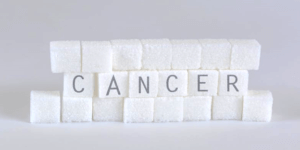What is the connection between sugar and cancer?
Does sugar cause cancer? If one has cancer, does sugar contribute to its growth? This has been a debatable question for a very long time, but unfortunately there are no simple answers to it. The question has merit, but at the same time it is fueled largely by misinterpreted science.
Usually, when there’s sufficient oxygen, healthy cells utilise that to convert glucose (a basic sugar) into energy by the process of aerobic respiration. And when the oxygen is low, the cells use an alternative process, anaerobic respiration, to generate energy from sugar, but not nearly as much as aerobic respiration. Thus, it is safe to say that anaerobic respiration is less efficient fort energy production, and not the first choice for a healthy cell.
Nearly a century ago, a German scientist Otto Warburg hypothesised that cancer cells primarily use anaerobic respiration for energy even when oxygen is sufficient (1, 2). This means that the cancer cells require lot more glucose to generate energy. This came to be known as the Warburg effect. This made scientists wonder if cancer is fuelled by more sugar, perhaps one can prevent cancer by not eating sugar. There have been several studies that have tried to establish this connection. Scientists have observed a small increase in the risk of colorectal cancer with increasing intakes of carbohydrate, sucrose or fructose in men. However, this was not statistically significant, and they also did not find any association of cancer with women (3). It was hypothesised that increased sugar causes hyperinsulinemia (high insulin levels) which further promotes colon cancer progression (4). But the authors of a 2014 study failed to establish a direct and substantial link between sugar and colon cancer (5), where other factors apparently increased cancer risk, like smoking.
Since Warburg’s time, the actual causes of cancer have been discovered. Researchers have uncovered genetic mutations as a primary cause of cancer. Cells also attain malignancy through epigenetic changes, a mechanism that alters expression patterns and cellular signalling pathways. This has been established in a number of studies where human cancer cells harboured epigenetic abnormalities (6-8). Thus, the causes of cancer are complex.
Interestingly, while the link between sugar and cancer has been challenged, it is also worth noting that people with type II diabetes are prone to cancer (9). One explanation could be that in type II diabetes, insulin is unable to carry glucose to the cells effectively. As a result, pancreas produces more and more insulin and this results in hyperinsulinemia. Importantly, besides maintaining blood glucose levels, insulin stimulates cell growth, and this can trigger abnormal cell growth leading up to cancer. Recently, scientists at American Chemical society meeting 2019 reported a study to explain how this could possibly happens (10). They looked at the connection between heightened blood glucose and DNA damage, resulting in genome instability and cancer. They realized that chemically modified DNA bases occurred more frequently in diabetes inflicted rodents compared to the normal ones. The reason for this was that in this model, one of the proteins that were downregulated is directly responsible for activating DNA repair genes, establishing the link between diabetes and cancer.
This discussion though remains incomplete without a mention of obesity and cancer. High consumption of sugar leads to obesity, which affects growth, metabolism (like insulin resistance) and reproductive cycles. These signals trigger the cells in our body to divide more often than required and can lead to cancer (11, 12). The International Association for Research on Cancer has agreed that obesity causes cancer and has suggested people to keep a check on their weight.
Nevertheless, the fact remains that there are no conclusive studies which have linked sugar consumption to cancer directly. The body digests our consumed foods and converts everything to glucose that is eventually used by cells. So, even if one restricts sugar consumption, it will not necessarily inhibit the growth of a tumour, because the tumour will be able to access sugar anyway. The bottom line is that it is okay to consume sugar, in moderation, and from natural sources. And the occasional indulgence is simply unlikely to increase your chances of getting cancer.
References:
- Warburg O., Versuche an überlebendem carcinom-gewebe. Klin Wochenschr 1923;2:776-7. 3.
- Warburg O., über den stoffwechsel der carcinomzelle. Naturwissenschaften 1924;12:1131
- Michaud DS, Fuchs CS, Liu S, Willett WC, Colditz GA, Giovannucci E., Dietary glycemic load and risk of colorectal cancer in the Women’s Health Study., Cancer Epidemiol Biomarkers Prev. 2005 Jan;14(1):138-47
- Giovannucci E., Insulin, insulin-like growth factors and colon cancer: a review of the evidence. J Nutr. 2001 Nov; 131(11 Suppl):3109S-20S.
- Zhenjie Wang, et. al. Sugars, sucrose and colorectal cancer risk: the Fukuoka colorectal cancer study. Scand J Gastroenterol. 2014 May; 49(5): 581–588.
- Baylin SB, Jones PA., A decade of exploring the cancer epigenome – biological and translational implications. Nat Rev Cancer. 2011 Sep 23; 11(10):726-34.
- Sandoval J, Esteller M., Cancer epigenomics: beyond genomics. Curr Opin Genet Dev. 2012 Feb; 22(1):50-5.
- Sharma S, Kelly TK, Jones PA., Epigenetics in cancer. Carcinogenesis. 2010 Jan; 31(1):27-36
- Cannata D, Fierz Y, Vijayakumar A, LeRoith D. Type 2 diabetes and cancer: what is the connection? Mt Sinai J Med. 2010 Mar-Apr;77(2):197-213
- How diabetes can increase cancer risk: DNA damaged by high blood sugar. https://www.sciencedaily.com/releases/2019/08/190825075932.htm
- Calle, E. E. & Kaaks, R. Overweight, obesity and cancer: Epidemiological evidence and proposed mechanisms. Nat. Rev. Cancer 4, 579–591 (2004).
- Renehan, A. G., Zwahlen, M. & Egger, M. Adiposity and cancer risk: New mechanistic insights from epidemiology. Nat. Rev. Cancer 15, 484–498 (2015)
© Antara Mazumdar

This work is licensed under a Creative Commons Attribution-NonCommercial 4.0 International License.

Leave a Reply